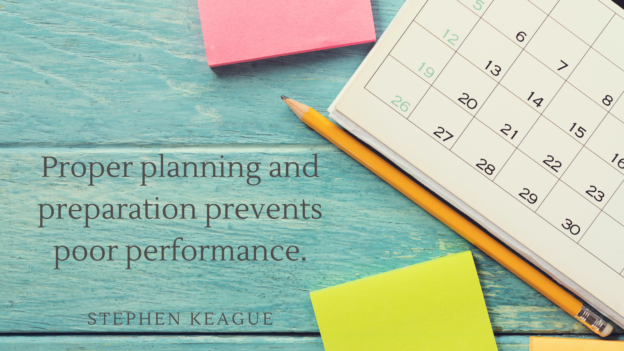No one likes to be called out for their mistakes, least of all the teacher or trainer. When I was a newbie instructor teaching undergraduate college students basic German language skills, I lived in fear of not knowing the answer to a potential question. I prepared for class endlessly – or so it seemed – so that I wouldn’t appear to be less than an authority in the subject I was teaching.
Much of this over-preparation was due to my lack of confidence. For reasons I won’t go into here, I felt like I needed to be at the top of my game when I stood in front of a group of students. I had a detailed lesson plan for each class, and I prepared more material than we had hopes of covering in the time allotted.
I still teach from a lesson plan today. Frankly, I don’t know how to do it any differently. I create an outline for the class, then go back and refine it. When I refine the topics, I determine how much time we’ll need to cover each topic. Finally, I make sure I have more material than I need just in case we get through something faster than I anticipated.
This seems logical to me, but I’ve sat in too many seminars and continuing education classes where the instructor ran out of material or didn’t know how to use different techniques to manage the time better. Even more painful were the instances where the instructor didn’t know the material they were covering. I’ve seen this occur when someone is teaching a set curriculum and does not need to devise a lesson plan (or so they think).
Adults have little tolerance for instructors who waste their time or don’t present the material they thought they would get. People will vote with their feet and attend those classes and programs that deliver on their promises with engaging instruction.
Here are my recommendations for teachers and trainers who want to deliver great instruction:
- Know your material: This might seem evident, but it’s worth keeping in mind. You will lose all credibility, especially with adults, if you appear to not know your subject. If you are teaching from a curriculum you did not prepare, you should study it thoroughly so that you are prepared to present it. Sure, there may be questions that arise that are out of the norm. It’s o.k. to acknowledge such a question and tell the student you’ll find out and get back to them. Do it and add the information to your knowledge base. There’s no excuse for not knowing the material you teach.
- Prepare well: You may not be as persnickety as I am about lesson planning, but you do need to do something to get ready to teach. Maybe it’s a review of the topics or material you will be presenting. Perhaps you need to find some illustrations or pictures to help get your points across. Whatever you need to do to feel comfortable when you walk into the room, take time to do it.
 I like to have written notes to remind me of the points I need to cover. With the switch to online instruction, I swapped my full-page notes for small sticky notes around my screen so that I can see my points as I continue to look into the camera.
I like to have written notes to remind me of the points I need to cover. With the switch to online instruction, I swapped my full-page notes for small sticky notes around my screen so that I can see my points as I continue to look into the camera. - Practice: I never liked it when my mother would tell me repeatedly that “practice makes perfect,” but there is something true about the value of practice. When was the last time you practiced delivering your material for a class? I can hear you tell me that you’ve done it so many times, you don’t need to practice. I understand that. But what about the new material you plan to present? What about that new class you’ve been tapped to teach? You don’t need an audience to practice, just a willingness to feel uncomfortable as you perfect your delivery.
- Be grateful: I think the ability to stand in front of a group of people willing to learn what I can teach them is special. I am very grateful I have the ability to be the teacher. I remind myself of this often, and especially when I am getting ready for a class. Maybe you want to say a prayer or meditate, or maybe it’s a gratitude list in your journal. It’s up to you how you express your gratitude for the opportunity to teach, but I recommend you do it. Your perspective will shift when you approach teaching with gratitude.
What you do before you step into the classroom defines what happens during instruction. When you know your material, prepare well, practice, and express gratitude, teaching is a transformative experience for your students – and you.

